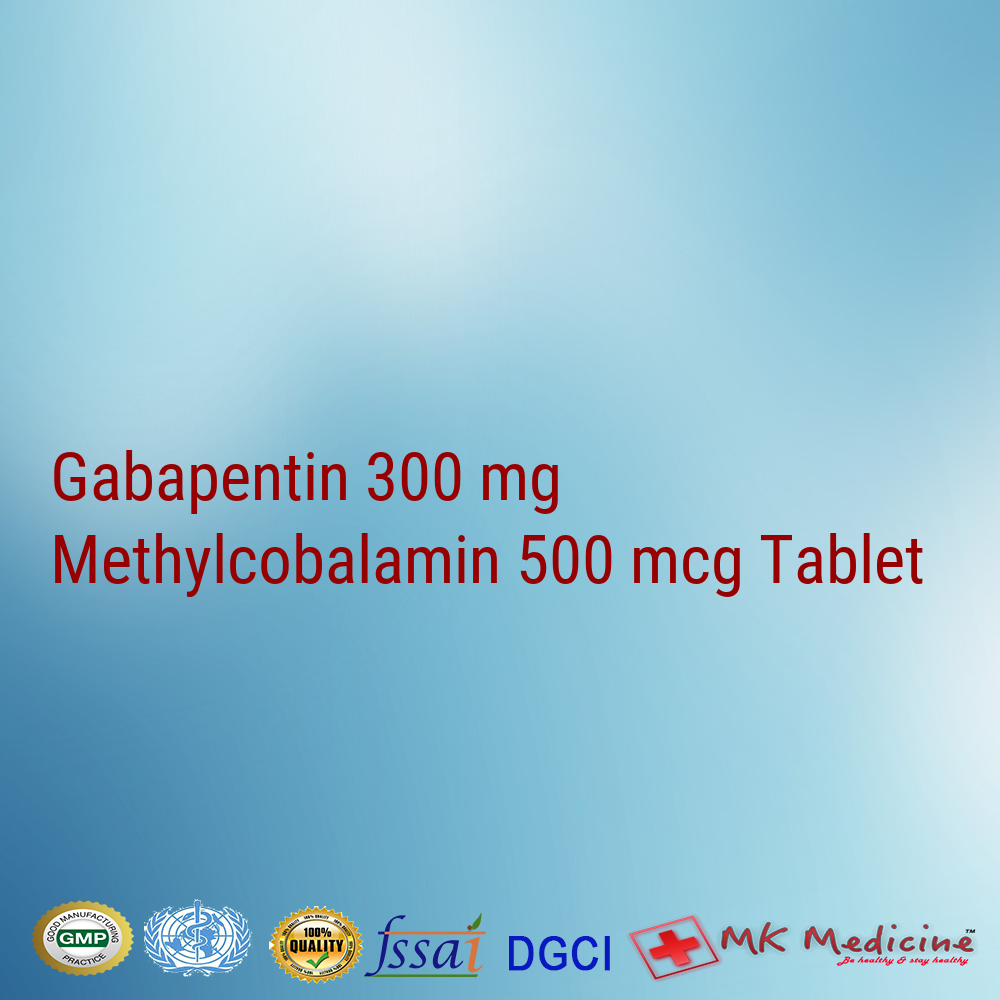Methylcobalamin and Gabapentin combination is useful for the treatment of neuropathic disorders or seizure disorders. Methylcobalamin is a form of vitamin B that is used to prevent postherpetic neuralgia, neuralgia intercostals, and diabetic neuropathy. Gabapentin is an anti-convulsant that prevents repeated electrical signals in the brain that cause seizures and is used to treat epilepsy or other similar disorders.
Gabapentin is used in combination with other antiseizure (anticonvulsant) drugs to manage partial seizures with or without generalization in individuals over the age of 12. Gabapentin can also be used to treat partial seizures in children between the ages of three and 12. Off-label uses (legal uses not specifically approved by the United States Food and Drug Administration [FDA]) include treatment of severe, chronic pain caused by nerve damage (such as occurs in shingles, diabetic neuropathy, multiple sclerosis, or post-herpetic neuralgia). Studies are also looking at using gabapentin to treat bipolar disorder (also known as manic-depressive disorder).
Some of the disorders that may be preventable or treatable with this natural vitamin therapy, called methylcobalamin, include chronic fatigue syndrome, Parkinson‚s disease, peripheral neuropathies, Alzheimer‚s disease, muscular dystrophy and neurological aging. Americans have immediate access to this unique and new form of vitamin B-12, and, unlike prescription drugs, it costs very little and is free of side effects. The most common form of vitamin B12 is called cyanocobalamin. However, over the last ten years, a number of central and peripheral neurological diseases have been linked to a deficiency of a very specific cobalamin, the methylcobalamin form, that is required to protect against neurological diseases and aging. The liver converts a small amount of cyanocobalamin into methylcobalamin within the body, but larger amounts of methylcobalamin are necessary to correct neurological defects and protect against aging.
MK Medicine is a leading pcd franchise provider, contract manufacturer and hospital supplier of WHO-GMP certified Gabapentin 300 mg Methylcobalamin 500 mcg Tablet
Like other antiepileptic drugs, gabapentin may cause suicidal thoughts or actions in a very small number of people, about 1 in 500.
Call a healthcare provider right away if you have any of these symptoms, especially if they are new, worse, or worry you:
- thoughts about suicide or dying
- attempts to commit suicide
- new or worse depression
- new or worse anxiety
- feeling agitated or restless
- panic attacks
- trouble sleeping (insomnia)
- new or worse irritability
- acting aggressive, being angry, or violent
- acting on dangerous impulses
- an extreme increase in activity and talking (mania)
- other unusual changes in behavior or mood
The most common side effects of Gabapentin include:
- dizziness
- lack of coordination
- viral infection
- feeling drowsy
- feeling tired
- fever
- jerky movements
- difficulty with speaking
- temporary loss of memory
(amnesia) - tremor
- difficulty with coordination
- double vision
- unusual eye movement
The most common side effects of Methylcobalamin include:
Common side effects :
- Headache
- Itching
- Swelling
- Nervousness and anxiousness
- Involuntary or uncontrollable movements
Serious side effects:
- Low levels of potassium in the blood
- Congestive heart failure
- Clots in the arms and legs
- Life-threatening allergic reaction called anaphylaxis, in which you may have trouble breathing, your tongue swells and/or throat closes up, and your skin breaks out into hives
- Fluid building up in the lungs
Important Notice:- The Database is still under development and may contain inaccuracies. It is not intended as a substitute for the expertise and judgement of your physician, pharmacist or other healthcare professional. It should not be construed to indicate that the use of any medication in any country is safe, appropriate or effective for you. Consult with your healthcare professional before taking any medication.


Amitriptyline 12.5 mg Chlordiazepoxide 5 mg Tablet